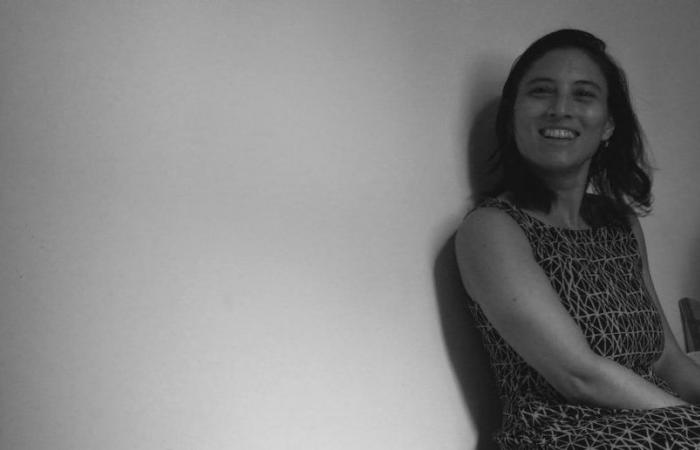Saturday 15.6.2024
/
Last update 11:07
The writer, teacher and researcher from Rosario Irina Garbatzky entrusted herself with a beautiful and challenging task at a time when she had to go through unpleasant health: during seven days that she would remain locked up for radioactive treatment, she was going to write a diary during that confinement. But instead of seeing her circumstance as a confinement, it was a creative and challenging opportunity that excited her. She called it ‘Camp’, and it is already a book.
A camp is a promising adventure, a return to childhood, detached from comfort, but it always involves nature, friends, and also a meeting with yourself, if you know how to take advantage of it. To the camp she took a mini home of food and medicine, and to write. For a week in March 2023, she locked herself in a friend’s borrowed house, in a downtown block, around the corner from her house, among plants and books.
More than a year after meeting that goal, through self-corrections and editing to polish each sentence, Irina published her book Campamento with Minibulk, a Chilean publisher, and will present it on Friday, June 28 at 6 p.m. in the bookstore. Oliva with the writers Paula Galansky and Alberto Giordano. It was the latter – considered the thinker of the new national “literature of the self” – who proposed to materialize it in a book.
The author of this autofiction in poetic prose tone spoke with Mirador to advance a little about that particular experience in which she embarked: “I felt that I was carrying many things like the travel kit: food, remedies and instructions. And I like the precarious scene in the camp. My perception of life is that: it is uncertain, not much is known why or how long we will be on this planet. So, in that precariousness, one finds refuge in friends and in survival.”
Irina is fascinated by small things, and in the camps you take little pots, small stoves, because you are moving to a mini home. But the senses are also heightened, and the process of photosynthesis of a plant is appreciated. In one fragment, Irina dedicates her pages to a plant that she adores: You could write a book, a small book, that is only the story of that plant. Just as in those analysis sessions the only thing that counted was what I didn’t count—the fascination with the long-leaf philodendron—those pages could be filled with the surprise that came from hearing the very soft crack-crack they made when their leaves opened.
In tune with this appreciation of Eastern philosophy towards nature, -she even makes reference to ‘The Silent Transformations’ by Francois Jullien-, the author in another fragment of the book specified: It is enough to organize a drawer to feel like you are on a trip.
Regarding this thought, Irina stated: “I like to think about what is the minimum distance that is needed to be able to move from your life. Like the story ‘Journey Around My Room’ by Xavier de Maistre, or the story ‘Wakefield’ by Nathaniel Hawthorne.”
Gentleness
Haikus, aliens and ghosts at camp
During that space that the writer gave herself in the time that continued to pass daily for all her affections, she not only appreciated and took note of the development of a plant. She also took with her the dialogues she had with her loved ones every day, and took note of each one, as an anthropologist of her own life. They recommended series like Gilmore Girls, encouraged her with their vision of the idea of camp, and even had specific requests from those who understood that they would be the object of her writing: “Make me young and skinny,” was her aunt’s request. And the author recorded: “I decided to write about those seven days in the tone of ‘during’ those days, which gives it that sensation of everyday reality and also has the logic of a beginning and an end. I decided that those who orbited her would be mentioned in the camp, such as my aunt, who demanded that I make her young and skinny.
The rest of her people continued life while she watched in pause, and when a friend called her, she took the opportunity to question them about their days, to add to the book. She “she cut off the call and started recording what they told me. It was fun, it had something playful about it.”
Irina’s enthusiasm was overflowing, to the point that she herself expressed: “I was excited, I got out of myself a little. She was experiencing the treatment process that had dates, and it was stressful for her. But I got into this self-proposal, and I had a tremendous acceleration, excited about that camp, which I sustained until the end. And it was before the confinement, when I notified friends of my plan, that Giordano suggested publishing it in Mini Bulk.”
But during the period he also recorded thoughts and situations worthy of science fiction: turning fluorescent or extraterrestrial in color due to radioactive treatment, and even a moment of movie suspense when one night he felt afraid of a spectral presence. Regarding this, she admitted: “I’m very afraid, and I thought I was going to live alone in a house that wasn’t mine, and I even asked María if a thief couldn’t get in somewhere, and at one point I was afraid.” ”.
Among the literary references, there is also the poetry of Katherine Mansfield, and a novel by Silvya Plath, ‘The Bell Jar’, which she read just before the confinement. From this she took an idea about “the tragic line of youth, which suggests that there are many options, and then they are lost. I was interested in her idea that one can experience his events in two ways: as tragic or as comic. It’s like the Woody Allen movie, Melinda and Melinda. It is the same story in the tragedy version and in the comedy version. Everything is lived according to the point of view, and I was processing some of that.”
The book “Camp” reads like a personal diary, but it can also be a story, or many, or haikus. In limpid prose, each day that Irina narrated works like a micro-story. About this she explained: “I cared a lot about how each part sounded, more than telling so many things. Friends told me that it will tell more. But I was more interested in the effect that a question, an image, a silence produces on a page of a single sentence. Kamenszain’s ‘The Novel of Poetry’ is always going around.”






